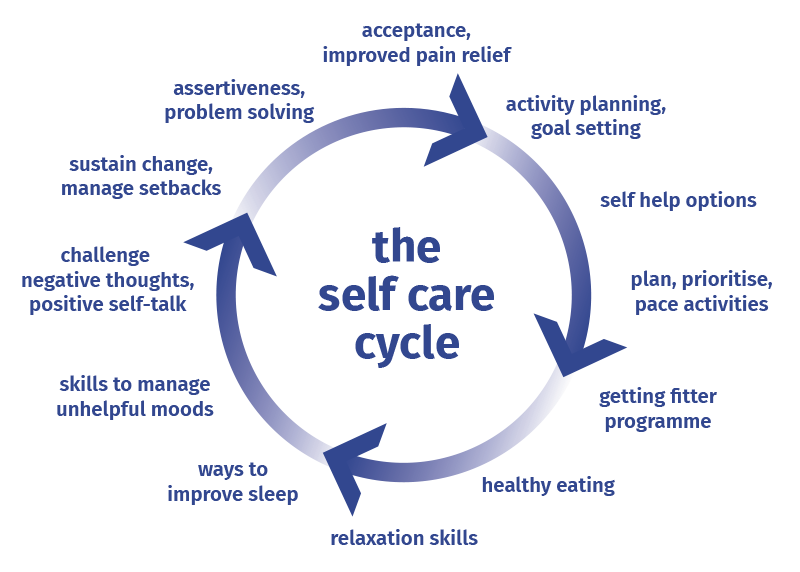How to use the Ten Footsteps as a practitioner
As a practitioner working with someone on the Ten Footsteps, you will be going on a journey with them as they first come to terms with, then begin to gain a deeper understanding of, and finally learn the skills to self-manage their pain.
Each of the ten footsteps is a stage along that journey and covers a discrete self-management theme. Each is recognised by clinicians and people who successfully live with pain, to be a vital component in the ‘toolkit’ of people who have learnt to manage their pain effectively.
The order of the ten footsteps follows a pattern that has been identified in people learning to self-manage. This is sometimes known as the self-care cycle.

What is the self-care cycle?
The self-care cycle describes the process by which a person with chronic pain:
-
first learns more about their condition;
-
then begins to accept it for what it is;
-
develops a plan to do something about it;
-
takes action based on that plan;
-
encounters setbacks;
-
learns to overcome them;
-
and ultimately comes full circle, recommitting and recommencing their life journey towards living well despite their pain.
Our Ten Footsteps are organised to broadly reflect this process.
Acceptance, for example, is located early (footstep 2), as it is in some ways a prerequisite for embracing the whole idea of self-managing one’s pain.
However, in reality acceptance does not always come all at once, and it would be unproductive to insist on a person ‘completing’ a footstep before moving on.
In other words, it isn’t essential always to work through the footsteps in chronological order . . .
The order isn’t everything
Although the footsteps are arranged in a loosely chronological order, it is important to remember that:
the person you are working with may not embrace the idea of self-management or explore its different dimensions in the precise order that we prescribe, and
they may want or need to return to certain ‘steps’ more than once, for reinforcement, learning or simply reassurance.
In reality you may find yourself working with a person on more than one footstep at once, or return to a theme with them if they are struggling to integrate it into their life.
Working with the person
This idea of ‘working with’ is key. If the person with whom you’re working is to become an effective self-manager of their pain, their active involvement is absolutely vital. That’s why many of the resources included in each footstep can be printed off directly, for you to give to the person during a consultation.
When you give a printout to them, it’s a good idea to suggest that they share with you what they learn from it at their next appointment. Getting a person’s ‘buy-in’ to the idea that they will be speaking about the resource next time you meet is one way to ensure that it actually gets read.
Other resources are links to online content, which again you can give to the person, with a suggestion that they tell you what they think of it at your next appointment.
Some of the links are to videos made with people who have already travelled on the self-management journey themselves. These first person testimonials will inspire the person with whom you are working – and you.
As you explore these resources with them, they will gradually find that a better life is possible, despite the pain.
And, by using Ten Footsteps as part of your work with them, you’ll find that it’s possible to support their adoption of a self management approach, and that – despite the frustrations – it can be interesting, fun, thought provoking and satisfying!